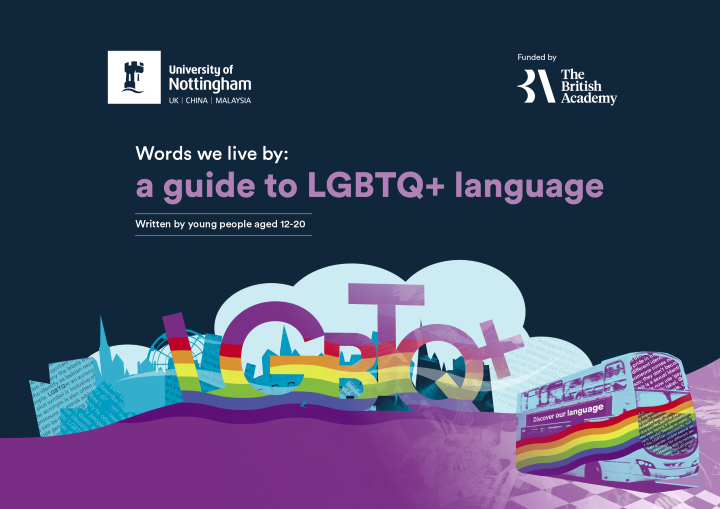Tuesday, 02 July 2024
A glossary of words, defined by young LGBTQ+ people in England, has been created by a University of Nottingham academic, to help people better understand the language used to describe their lives.
Words We Live By: A Guide to LGBTQ+ Language has been produced by Dr Lucy Jones, a sociolinguist who studies language and society in the School of English, and has been working with LGBTQ+ young people, aged from 12 to 20, to find out about their experiences in school and within the family.
The guide features words – all chosen and defined by the young people – including identity labels (such as pansexual and non-binary) and important concepts (like misgendering and pride). It has been produced as both an online resource, and in print form as an A2 poster that folds out in the style of an Ordnance Survey map. Although available as a resource for the public, it has been developed primarily as a tool to help teachers, social workers, clinicians, charities, and other public facing services who interact with young people.
It evolved from research Dr Jones has conducted with LGBTQ+ youth groups in the North and Midlands since 2018, funded by the British Academy. By understanding the day-to-day encounters of the young LGBTQ+ participants in the project, Dr Jones has been able to analyse their talk from a linguistic perspective and observe how they are using language to position themselves in society.
During my research, young people have told me that they often feel misunderstood by the adults in their lives, even when they’re trying to offer support. If we don’t understand the words young people are using to describe their experiences, communication can break down and make it harder to help them. It became clear that we all need a better understanding of the language young LGBTQ+ people use to define themselves; this includes learning about the different labels they use and understanding the importance of not making assumptions about their gender or sexuality.”
In her research, Dr Jones was a participant observer in youth groups and through interviews conducted with the young participants, she learnt the importance of language to their sense of self.
 Words we live by: a guide to LGBTQ+ language
Words we live by: a guide to LGBTQ+ language
One 15-year-old participant explained how it felt when teachers and other school staff addressed them with the wrong pronouns: “We’re already stressed out just about being us, and with this added on, it just doesn’t help!”
Language constantly evolves and words that young people are using now – like gay or queer – may have a very different meaning to 10 years ago, or not have existed at all. And in another 10 years’ time, they could have a different meaning again.
Dr Jones added: “The glossary shows the words that are being used by young people today, but Words We Live By isn’t meant to be definitive or forever. My hope is that it will start a dialogue about why language is so important to our identity. And even though it keeps changing and evolving, why it’s important, particularly for adults working with potentially vulnerable young people, to make the effort to get it right. If you want to be an ally you need to understand the language.”
The guide can be seen as part of a free installation at the National Justice Museum in Nottingham until 29th September 2024, where visitors can pick up a print copy and contribute their own words to an evolving online LGBTQ+ glossary. The installation launches at Notts Pride on Saturday 27th July and Dr Jones will be there between 10-11.30am to answer questions about the project. You can also follow the Words We Live By project on Instagram, X and Facebook by searching for @LGBTQwords.
Story credits
More information is available from Dr Lucy Jones, Associate Professor in Sociolinguistics, via lucy.jones@nottingham.ac.uk
Notes to editors:
About the University of Nottingham
Ranked 24 in Europe and 15th in the UK by the QS World University Rankings: Europe 2024, the University of Nottingham is a founding member of Russell Group of research-intensive universities. Studying at the University of Nottingham is a life-changing experience, and we pride ourselves on unlocking the potential of our students. We have a pioneering spirit, expressed in the vision of our founder Sir Jesse Boot, which has seen us lead the way in establishing campuses in China and Malaysia - part of a globally connected network of education, research and industrial engagement.
Nottingham was crowned Sports University of the Year by The Times and Sunday Times Good University Guide 2024 – the third time it has been given the honour since 2018 – and by the Daily Mail University Guide 2024.
The university is among the best universities in the UK for the strength of our research, positioned seventh for research power in the UK according to REF 2021. The birthplace of discoveries such as MRI and ibuprofen, our innovations transform lives and tackle global problems such as sustainable food supplies, ending modern slavery, developing greener transport, and reducing reliance on fossil fuels.
The university is a major employer and industry partner - locally and globally - and our graduates are the third most targeted by the UK's top employers, according to The Graduate Market in 2024 report by High Fliers Research.
We lead the Universities for Nottingham initiative, in partnership with Nottingham Trent University, a pioneering collaboration between the city’s two world-class institutions to improve levels of prosperity, opportunity, sustainability, health and wellbeing for residents in the city and region we are proud to call home.
More news…